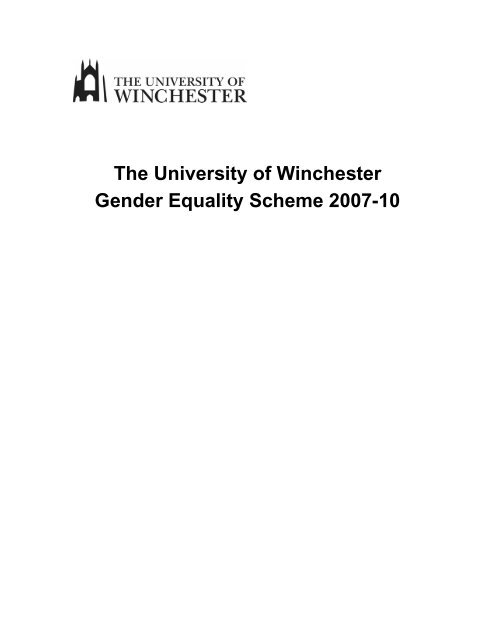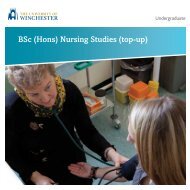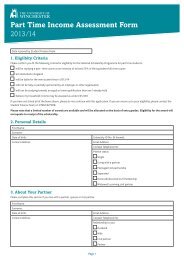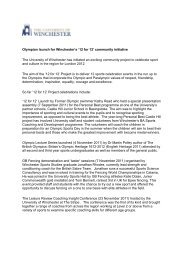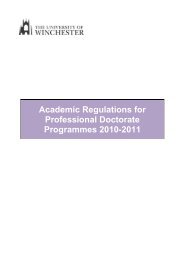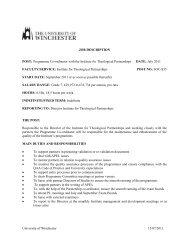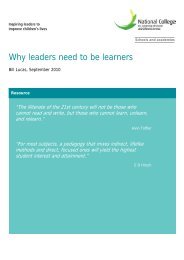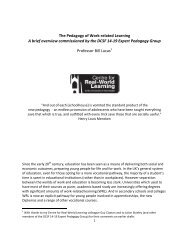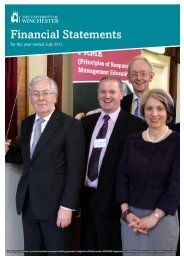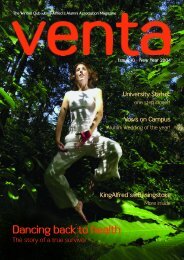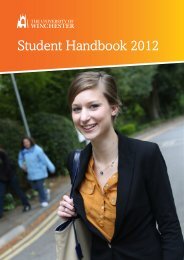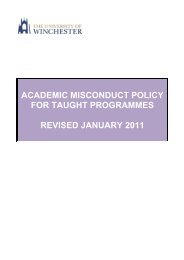Gender Equality Scheme - University of Winchester
Gender Equality Scheme - University of Winchester
Gender Equality Scheme - University of Winchester
Create successful ePaper yourself
Turn your PDF publications into a flip-book with our unique Google optimized e-Paper software.
The <strong>University</strong> <strong>of</strong> <strong>Winchester</strong><br />
<strong>Gender</strong> <strong>Equality</strong> <strong>Scheme</strong> 2007-10
Section A - Introduction<br />
Contents<br />
…….1<br />
1 Leadership Statement: The <strong>University</strong> <strong>of</strong> <strong>Winchester</strong>’s Vision …….1<br />
2 What is the Disability <strong>Equality</strong> <strong>Scheme</strong> and why is it important to …….2<br />
the <strong>University</strong> <strong>of</strong> <strong>Winchester</strong> and me?<br />
2.1 Definitions <strong>of</strong> sex and gender …….3<br />
Section B – Development <strong>of</strong> the GES at the <strong>University</strong> <strong>of</strong> <strong>Winchester</strong> …….4<br />
3 Advice and Guidance …….4<br />
4 Collaborative working …….4<br />
5 Communication; consultation; data collection …….4<br />
Section C – Disability equality at the <strong>University</strong> <strong>of</strong> <strong>Winchester</strong> …….7<br />
6 Pr<strong>of</strong>ile <strong>of</strong> institution – Where are we now? …….7<br />
7 <strong>Gender</strong> Action Plan …….7<br />
8 Equal Pay Audit …….7<br />
9 Monitoring Data and Impact Assessment …….7<br />
9.1 Monitoring …….7<br />
9.2 Impact Assessment …….8<br />
10 Benchmarking the <strong>University</strong> <strong>of</strong> <strong>Winchester</strong> against other …….9<br />
institutions<br />
11 What we are currently doing. …….9<br />
11.1 Policies in place to tackle gender inequality …….9<br />
11.3 Staff Development Unit ……10<br />
11.4 Teaching and Learning ……11<br />
11. Widening Participation ……12<br />
11.11 Contractors and Service Providers ……12<br />
11.2 Purchasing & Procurement ……12<br />
11.5 Transgender people and <strong>Gender</strong> Reassignment ……13<br />
11.6 Summary <strong>of</strong> Results <strong>of</strong> Staff Consultation ……13<br />
11.6.1 Summary <strong>of</strong> staff questionnaire ……13<br />
11.6.2 Summary <strong>of</strong> staff focus groups ……15
11.7 Summary f Results <strong>of</strong> Student Questionnaire ……15<br />
Section D - Prioritising and promoting gender equality<br />
……16<br />
12 Scope <strong>of</strong> the scheme ……16<br />
13 Responsibilities ……16<br />
14 Key Resources ……16<br />
15 Communication and Training ……16<br />
16 Assessing, reviewing, impact assessment and reporting ……16<br />
17 Breaches <strong>of</strong> the scheme and complaints ……17<br />
Section E - Action plan ...18-24<br />
Appendix 1: Impact Assessment management Process and Timetable<br />
Appendix 2: Summary <strong>of</strong> responses to consultation
GES Section A - Introduction<br />
1: Leadership Statement: The <strong>University</strong> <strong>of</strong> <strong>Winchester</strong>’s Vision<br />
The <strong>Gender</strong> <strong>Equality</strong> Duty is the third <strong>of</strong> the public sector equality duties.<br />
The three public sector duties, race, disability and gender, are extremely<br />
important to the <strong>University</strong> <strong>of</strong> <strong>Winchester</strong>. They link very closely with our six<br />
institutional values:<br />
• Academic freedom<br />
• Social justice<br />
• Diversity<br />
• Individuals matter<br />
• Spirituality<br />
• Creativity<br />
We seek to ensure and promote equality in all our endeavours<br />
throughout the university at all times.<br />
VC signature
2: What is the <strong>Gender</strong> <strong>Equality</strong> <strong>Scheme</strong> and why is it important to the<br />
<strong>University</strong> <strong>of</strong> <strong>Winchester</strong> and me?<br />
In its vision statement, the <strong>University</strong> declares its intention "to be a twenty-first<br />
century institution which provides a progressive and challenging higher<br />
education experience and which forms a crucible for the generation and<br />
transfer <strong>of</strong> knowledge” 1 . In order to realise this vision, we need to ensure that<br />
we recruit and retain the most skilled and experienced teaching and support<br />
staff to deliver learning opportunities and support services <strong>of</strong> the highest<br />
standard. We must also recruit and retain students <strong>of</strong> the highest calibre. When<br />
recruiting, we need to ensure that we can choose from the widest pool <strong>of</strong> talent<br />
that is available – irrespective <strong>of</strong> gender. We want to ensure that we retain the<br />
skills and experience <strong>of</strong> those we recruit. We aim to ensure that all stakeholders<br />
are able to contribute to the development and success <strong>of</strong> the <strong>University</strong>. To this<br />
end, “the <strong>University</strong> is committed to promoting equality, diversity and an<br />
inclusive and supportive environment”, and all stakeholders “are required to<br />
treat each other fairly and with respect, and will be afforded opportunities to<br />
fulfil their potential.” 2 We are committed to developing the <strong>University</strong> <strong>of</strong><br />
<strong>Winchester</strong> in order to make it an organisation that is inclusive to men, women<br />
and transgender people.<br />
1<br />
The <strong>University</strong> <strong>of</strong> <strong>Winchester</strong>, Strategic Plan 2005/11<br />
2<br />
The <strong>University</strong> <strong>of</strong> <strong>Winchester</strong>, Equal Opportunity Policy Statement
Whilst the <strong>University</strong> <strong>of</strong> <strong>Winchester</strong> must meet legal requirements, we are<br />
committed to going beyond that, developing our policies and culture according<br />
to models <strong>of</strong> best practice.<br />
The new legislation on gender aims to ensure that universities adopt an<br />
approach to gender that focuses on celebrating diversity and actively promotes<br />
equality <strong>of</strong> opportunity for men and women.<br />
The purpose <strong>of</strong> the <strong>University</strong> <strong>of</strong> <strong>Winchester</strong>’s <strong>Gender</strong> <strong>Equality</strong> <strong>Scheme</strong> is to<br />
explain how the <strong>University</strong> will make sure that it promotes gender equality for<br />
stakeholders and challenge discrimination whether direct or indirect.<br />
The objectives <strong>of</strong> this equality scheme are:<br />
• To remove barriers for women, men and transgender people in the<br />
workplace, including barriers to career progression and inequality <strong>of</strong><br />
pay.<br />
• To remove barriers for women, men and transgender people to<br />
study.<br />
• To ensure awareness and understanding <strong>of</strong> gender and transgender<br />
issues among staff and students at all levels <strong>of</strong> the institution.<br />
The <strong>Gender</strong> <strong>Equality</strong> <strong>Scheme</strong> for the <strong>University</strong> <strong>of</strong> <strong>Winchester</strong> will be<br />
championed by Tommy Geddes, Pro-Vice Chancellor and Karen Price,<br />
Director <strong>of</strong> Human Resources, who has overall responsibility for the<br />
implementation <strong>of</strong> the scheme and the action plan.<br />
Definition <strong>of</strong> sex and gender<br />
The <strong>University</strong> acknowledges the difference between sex and gender. The<br />
university includes reference to non-discrimination on grounds <strong>of</strong> gender<br />
identity and sex in its equal opportunities policy.<br />
Sex refers to anatomical sex. <strong>Gender</strong> is expressed in terms <strong>of</strong> masculinity or<br />
femininity and describes how people feel about themselves and how they<br />
expect other people to behave towards them. For the majority <strong>of</strong> people their<br />
sex matches their gender. However, this is not always the case.<br />
The <strong>Gender</strong> <strong>Equality</strong> Duty covers women, men and transgender people.
Section B – Development <strong>of</strong> the GES at the <strong>University</strong> <strong>of</strong> <strong>Winchester</strong><br />
?: Advice and guidance<br />
On developing the <strong>Gender</strong> <strong>Equality</strong> <strong>Scheme</strong> the <strong>University</strong> has consulted with,<br />
and taken advice from, a number <strong>of</strong> sources:<br />
Equal Opportunities Commission (EOC), southern Local Equal Opportunities<br />
Network (LEON), Higher Education Equal Opportunities Network<br />
(HEEON), the <strong>Equality</strong> Challenge Unit (ECU), National Union <strong>of</strong> Students<br />
(NUS)<br />
?: Collaborative working<br />
The <strong>University</strong> has created a <strong>Gender</strong> <strong>Equality</strong> <strong>Scheme</strong> Working Group to steer<br />
the Universities response to the legislation. This group comprises individuals<br />
from across the <strong>University</strong> and includes female & male staff and student<br />
members (see Table 1). The Working Group is chaired by the Vice Chancellor.<br />
?: Communication; consultation; data collection<br />
The <strong>University</strong> has created a portal page introducing the new legislation,<br />
accessible to staff and students. This includes an option for free comment. An<br />
on-line questionnaire was hosted by a third party (Bristol On-Line Survey) and<br />
was available in hard copy (and alternative formats if requested). An<br />
information leaflet was distributed to all staff via payslips. A press release has<br />
been published in the <strong>University</strong>’s in-house newsletter. As noted above, the<br />
<strong>University</strong> has created a <strong>Gender</strong> <strong>Equality</strong> <strong>Scheme</strong> Working Group to steer the<br />
<strong>University</strong>’s response to the legislation.<br />
Following on from the on-line questionnaire, several focus groups were run to<br />
respond to, and focus on, comments and findings from the questionnaire.<br />
Student consultation has been achieved via the Student Union and through<br />
advice received from the NUS. A student questionnaire was administered<br />
through Union Council and members <strong>of</strong> the Student Union Executive were<br />
members <strong>of</strong> the Working Group.<br />
Through this variety <strong>of</strong> methods a cross section <strong>of</strong> the university demographic<br />
was consulted with.<br />
The <strong>University</strong> recognises the need to consult with transgender people on<br />
transgender issues. Both the <strong>Gender</strong> Trust and Press for Change were<br />
approached for advice.<br />
External stakeholders consulted included private, public and religious<br />
organisations that have used or do use our facilities.
See Table 2 for a breakdown <strong>of</strong> stakeholders involved in developing the<br />
<strong>University</strong> <strong>of</strong> <strong>Winchester</strong>’s <strong>Gender</strong> <strong>Equality</strong> <strong>Scheme</strong><br />
Table 1: Members <strong>of</strong> the <strong>Gender</strong> <strong>Equality</strong> <strong>Scheme</strong> Working Group<br />
Member<br />
Joy Carter<br />
Lenny Dalby<br />
Jonathan Watkins<br />
Julie Hampton<br />
Justin Ridgment<br />
Katie Curtis<br />
Julia Wright<br />
Drew Walsh<br />
Justine Mortimer<br />
Ruth Hellier-Tinoco<br />
David Chalk<br />
Tanya Rehman<br />
Role<br />
Vice Chancellor (Chair)<br />
<strong>Equality</strong> Officer<br />
Student Services representative<br />
Human Resources representative<br />
Director <strong>of</strong> CCS<br />
Student Union President<br />
SU Women’s Officer<br />
SU Equal Opportunities Officer<br />
Lecturer (Arts)<br />
UCU Representative<br />
Head <strong>of</strong> Law<br />
HR Assistant (Secretary)<br />
Table 2: Stakeholders who took part in developing the <strong>University</strong> <strong>of</strong><br />
<strong>Winchester</strong> 2007-2010 GES<br />
Stakeholder Female Male<br />
Academic Staff via staff questionnaire* 8 6<br />
Support Staff via staff questionnaire* 34 6<br />
Management via staff questionnaire* 2 1<br />
Academic Staff via focus groups 10 5
Support Staff via focus groups 7 3<br />
Management via focus groups 3 0<br />
Students via GESWG 2 1<br />
Students via SU Executive 3 2<br />
Students via Union Council 8 7<br />
External Facilities Users 3 1<br />
Total 80 32<br />
*Fourteen respondents to the on-line questionnaire did not declare their<br />
gender.
Section C – <strong>Gender</strong> equality at the <strong>University</strong> <strong>of</strong> <strong>Winchester</strong><br />
? Pr<strong>of</strong>ile <strong>of</strong> institution – Where are we now?<br />
?.1 <strong>Gender</strong> Action Plan<br />
In 2003 the <strong>University</strong> held an institution-wide <strong>Gender</strong> Day to consider gender<br />
issues in the institution and to disseminate information from the first Equal Pay<br />
Audit. An action plan was drawn up following this event. Any outstanding<br />
actions from the action plan will be subsumed into the <strong>Gender</strong> <strong>Equality</strong><br />
<strong>Scheme</strong> action plan.<br />
?.2 Equal Pay Audit<br />
An Equal Pay Audit (EPA) is undertaken on a biennial basis that considers,<br />
amongst other things, pay, grade and application for promotion. The first EPA<br />
was undertaken in 2003 and a further EPA undertaken in 2005. The next is<br />
due this year (2007). The Equal Pay Audit considers 17 detailed questions<br />
under 6 broader headings:<br />
• Are the average salaries <strong>of</strong> male staff higher or lower than the average<br />
salaries <strong>of</strong> female staff engaged in like work?<br />
• Are men and women disproportionately placed across the range <strong>of</strong> pay<br />
scales?<br />
• Is there evidence <strong>of</strong> men or women being more successful at promotion?<br />
• Are other forms <strong>of</strong> payment – honoraria, overtime, merit, market<br />
supplements – applied fairly between sexes?<br />
• Is there evidence <strong>of</strong> discrimination towards one sex on appointment?<br />
• Are there some roles/subjects that attract applicants from predominantly<br />
one sex?<br />
Completed EPAs are published on the university portal (intranet). Action<br />
points from EPAs will be incorporated in to the GES Action Plan.<br />
?.3 Monitoring Data and Impact Assessment<br />
?.3.? Monitoring<br />
As well as detailed data collected through the EPA the <strong>University</strong>’s annual HR<br />
Report includes gender monitoring data on its staff .
We have currently agreed to undertake annual <strong>Equality</strong> Monitoring, drawing<br />
together data collected for staff and students on disability, gender and race.<br />
This will include:<br />
Staff:<br />
Job Applicants<br />
Staff in post<br />
Promotion<br />
Grievance<br />
Disciplinary<br />
Dignity at Work (bullying and<br />
harassment) incidents<br />
Dismissals<br />
Exit monitoring<br />
Training/Staff Development<br />
Appraisal<br />
Students:<br />
Overview<br />
Applicants<br />
Admissions<br />
Progression<br />
Disciplinary<br />
Grievance<br />
Exit Monitoring<br />
Take up <strong>of</strong> students services<br />
Application and Allocation to<br />
<strong>University</strong> accommodation<br />
Issues raised through Student<br />
Satisfaction Survey etc<br />
An equality pr<strong>of</strong>ile for the <strong>University</strong> is available on the Human Resources<br />
portal.<br />
?.3.? Impact Assessment<br />
The <strong>University</strong> started the impact assessment process in 2005.<br />
Prior to starting on a management process for impact assessment for the<br />
institution the <strong>Equality</strong> Officer met with Sara Hunter at the <strong>University</strong> <strong>of</strong><br />
Ulster, where there was an existing obligation to equality impact assess policies.<br />
Guidance was also taken from the ECU/Hefce publication Conducting Impact<br />
Assessments for Equal Opportunities in Higher Education. The <strong>University</strong> has worked<br />
to the definition <strong>of</strong> impact assessment in the guidance - “the thorough and<br />
systematic analysis <strong>of</strong> a policy or practice to determine whether it has a<br />
differential impact on a particular group”.<br />
At the time <strong>of</strong> developing the impact assessment process the <strong>University</strong> only<br />
had a legal duty to impact assess with regards to race. The <strong>University</strong> took the
decision to impact assess on all equality areas in recognition that no one<br />
equality area stands alone and a duty to assess on other equality areas was likely<br />
to be introduced at a later date.<br />
The process was agreed through the <strong>University</strong> committee structure in<br />
2004/05, finally being endorsed at the Planning & Resources Committee in July<br />
2005 (PR121/04-05). This allowed for consultation on the process by a wide<br />
range <strong>of</strong> staff and students.<br />
The impact assessment management process:<br />
• Screens formal policies, regulations, guidelines & strategies and informal<br />
policies & practices/procedures<br />
• Set a timetable for initial screening and identification <strong>of</strong> requirements for<br />
full impact assessment<br />
• Acknowledges that impact assessment is not a one-<strong>of</strong>f undertaking and<br />
requires screening forms to be completed for all new policies and a review<br />
<strong>of</strong> screening <strong>of</strong> all formal polices etc to be included in the 3 year policy<br />
reviews.<br />
• Acknowledges that policy impact is not the responsibility <strong>of</strong> one individual<br />
but <strong>of</strong> all members <strong>of</strong> staff and thus requires policy owners to undertake the<br />
screening and full impact assessment (where necessary).<br />
By April 2007 the <strong>University</strong> has undertaken initial equality impact assessment<br />
screenings but has yet to complete the full impact assessments where required.<br />
This includes a full impact assessment <strong>of</strong> our Car Parking Policy, where<br />
concerns have been raised that part-time members <strong>of</strong> staff are disadvantaged,<br />
where the majority <strong>of</strong> part-time staff are female. The other policies identified<br />
for a full impact assessment were the Staff Development & Review <strong>Scheme</strong><br />
and the Customer Service Policy.<br />
?.4 Benchmarking the <strong>University</strong> <strong>of</strong> <strong>Winchester</strong> against other institutions<br />
The <strong>University</strong> will benchmark itself via data provided by HESA.<br />
? What we are currently doing<br />
?.1 Policies in place to tackle gender inequality
The <strong>University</strong> has several formal policies and an Employee Assistance<br />
Programme in place to help tackle gender discrimination and inequality in the<br />
workplace:<br />
Dignity at Work – deals with bullying and harassment in the workplace and<br />
specifically references harassment <strong>of</strong> a sexual nature or related to sex. A<br />
Dignity at Study Policy is currently in draft form to replace the Bullying &<br />
Harassment Guidelines for students.<br />
Employee Assistance Programme & Support Helpline – covers all work-related<br />
queries, including providing information and practical assistance to parents on<br />
a wide range <strong>of</strong> childcare and parenting issues<br />
Equal Opportunities Policy – covers staff and students and states that all staff<br />
and students are treated equitably regardless <strong>of</strong> any inappropriate distinction,<br />
including family responsibility, gender identity, marital status or sex.<br />
Equal Opportunities in Employment Policy – aims to ensure equality <strong>of</strong><br />
opportunity and prohibit any form <strong>of</strong> unlawful, unfair, obvious or hidden<br />
discrimination, including harassment, on any ground including gender identity<br />
and sex, in the workplace.<br />
Flexible Working Policy for support staff – the policy details the types <strong>of</strong><br />
flexible working options may be requested by staff.<br />
<strong>Gender</strong> Reassignment: a manager’s guide to supporting staff undergoing or<br />
intending to undergo gender reassignment – provides a brief introduction to<br />
gender reassignment and how to support a staff member who wishes to<br />
transition to their acquired gender.<br />
Parents & Carers Policy: support for staff with families and caring<br />
responsibilities – this policy includes information on maternity and paternity<br />
rights and right to request flexible working. It was formally known as the<br />
Support for Staff with Families policy.<br />
These policies will be promotes as part <strong>of</strong> GES action plan.<br />
?.2 Staff Development Unit<br />
The Staff Development Unit provides a range <strong>of</strong> events designed to raise<br />
awareness <strong>of</strong> equality and gender issues. The following are examples:<br />
• <strong>University</strong>-wide gender awareness events have taken place to which all staff<br />
are invited.<br />
• Roll-out <strong>of</strong> general equality and diversity training. This included gender and<br />
transgender issues.
• A section on equality and dignity is included in new staff induction.<br />
• A session on <strong>Gender</strong> and Conversation Style which raises awareness <strong>of</strong> the<br />
difference between the way men and women communicate.<br />
• The Postgraduate Certificate Learning and Teaching in Higher Education<br />
(PGCLTHE) includes sessions on equality and gender.<br />
?.3 Teaching and Learning<br />
A curriculum audit has taken place under the Learning and Teaching project<br />
Addressing Diversity and <strong>Equality</strong> the Curriculum. This, in part, came from the<br />
consideration <strong>of</strong> the impact assessment process.<br />
This project addresses issues specific to race, gender and disability with<br />
particular reference to the curriculum and has two phases. The first involves an<br />
audit <strong>of</strong> existing practice within the <strong>University</strong> drawing, where appropriate, on<br />
evidence from elsewhere, in order to identify existing good practice and<br />
barriers to development. The second will develop and trial a web-based toolkit<br />
<strong>of</strong> specific relevance to a small new university recruiting from a region in which<br />
perceptions tend to be <strong>of</strong> a monocultural and largely middle class catchment.<br />
Its focus will be on promoting curriculum development in order to both meet<br />
the needs <strong>of</strong> an increasingly diverse student population and to <strong>of</strong>fer curricula<br />
relevant to the global multicultural world in which students will be working and<br />
living.<br />
One <strong>of</strong> the intentions is to work in a way that tries to avoid some <strong>of</strong> the<br />
‘equality and diversity elephant traps’ including equality and diversity initiatives<br />
that generate at best reluctant action and at worst seething resentment;<br />
approaches that result in perceptions among academics <strong>of</strong> a PC discourse as a<br />
real and dangerous phenomenon; and underestimates <strong>of</strong> the time needed to<br />
talk to people if they are to engage at all let alone with real commitment.<br />
The project hopes to achieve the following<br />
• Better institution-wide understanding <strong>of</strong> curriculum issues related to<br />
inclusivity and diversity and <strong>of</strong> barriers to change<br />
• Increased engagement <strong>of</strong> academic staff with diversity and equality issues<br />
• Raised pr<strong>of</strong>ile for learning and teaching related diversity and equality issues<br />
among academic staff and senior managers<br />
• Staff development benefits for academic staff from each <strong>of</strong> the 3 Faculties<br />
• Enhanced leadership capacity among programme leaders and other<br />
academic staff
• Potential enhanced student experience<br />
• Contextualised strategies for use within the <strong>University</strong> and in similar<br />
contexts elsewhere<br />
Phase one, the curriculum audit, has been completed. Results are not available<br />
for publication at this time (April 2007).<br />
?.4 Widening Participation<br />
Men are under-represented in Initial Teacher Training programmes. The<br />
Faculty <strong>of</strong> Education runs initiatives to encourage male applicants and to<br />
support male students on teaching programmes. These include a Student<br />
Associate <strong>Scheme</strong> designed to give undergraduates experience <strong>of</strong> schools, with<br />
male students a major target audience for the scheme. The Faculty runs a male<br />
student support group, Men in the Minority, to help support and retain male<br />
students in teaching.<br />
The mix <strong>of</strong> subjects at the university currently attracts majority female students<br />
(70% female). It is recognised that a change in subject mix, such as the<br />
introduction <strong>of</strong> subjects such as law, may have an impact on the gender ratio <strong>of</strong><br />
students. This situation will be monitored.<br />
?.5 Contractors and Service Providers<br />
The Estates Department employs a large number <strong>of</strong> external contractors and<br />
service providers, as do other faculties and departments, in particular IT and<br />
Communication Services. Just because these organisations and individuals are<br />
not employed directly by the institution does not mean that they are exempt<br />
from the provisions <strong>of</strong> the <strong>Gender</strong> <strong>Equality</strong> <strong>Scheme</strong>, either in terms <strong>of</strong> its<br />
benefits or its responsibilities.<br />
The Estates Department already includes adherence to our Equal<br />
Opportunities Policy and Dignity at Work policy in its pro-forma<br />
documentation for contractors and service providers.<br />
In addition the institution will consider ways in which the institution might seek<br />
to procure goods and services from companies which promote gender equality.<br />
For example, when putting projects out to competitive tender, in order to<br />
ensure that external agencies not held to the same standard as the institution in<br />
terms <strong>of</strong> their legal requirements to promote gender equality, duly recognise<br />
this as an institutional priority.<br />
?.6 Purchasing and Procurement
The institution expends considerable funds each year on the purchasing <strong>of</strong><br />
goods and services, ranging from foodstuffs for the Dining Hall, to stationery<br />
for Reprographics. Indeed, very few, if any, <strong>of</strong> the institution’s faculties or<br />
departments are not involved in purchasing activities on a regular basis.<br />
Although at first sight it might appear unlikely that gender issues might impact<br />
upon this area <strong>of</strong> activity, it is important to recognise that no institution<br />
activities should be exempt from the considerations <strong>of</strong> the <strong>Gender</strong> <strong>Equality</strong><br />
<strong>Scheme</strong>. To this end, the institution should consider ways in which the<br />
institution might seek to procure goods and services from companies which<br />
promote gender equality, and to consider giving preferential consideration to<br />
such companies.<br />
?.7Transgender people and <strong>Gender</strong> Reassignment<br />
The <strong>University</strong> recognises the difference between sex and gender identity and is<br />
committed to supporting all (future) members <strong>of</strong> staff and students, including<br />
transgender people.<br />
In 2003, in response to the <strong>Gender</strong> Recognition Act, the <strong>University</strong> produced a<br />
guide for managers to help support (future) members <strong>of</strong> staff who should wish<br />
to transition to their acquired gender. The guidance was drawn up with<br />
reference to advice given by the <strong>Gender</strong> Trust and Press for Change as well as<br />
the ECU publication Employing Transsexual People in Higher Education. All<br />
aspects <strong>of</strong> the working environment were considered when drawing up this<br />
guidance.<br />
The institution will continue to consult with and seek guidance from<br />
transgender people on issues that have significance to transgender people.<br />
?.8 Summary <strong>of</strong> Results <strong>of</strong> Staff Consultation<br />
?.8.1Staff Questionnaire<br />
In 2003 the <strong>University</strong> conducted a Staff Satisfaction Survey that included the<br />
question “Discrimination is not a major issue here” and invited comments<br />
from those who felt there was discrimination. 6 members <strong>of</strong> staff (13% <strong>of</strong><br />
respondents) who indicated some discrimination indicated it was on grounds <strong>of</strong><br />
sex but no further evidence was supplied. The <strong>Gender</strong> <strong>Equality</strong> <strong>Scheme</strong> staff<br />
questionnaire built upon this information and tried to identify where<br />
discrimination or gender inequality was perceived.<br />
The questionnaire was designed to get base-level data on which to build.
The questionnaire was accessible on-line and hosted externally to the university<br />
(Bristol On-line Survey). Hard copies were available (and in alternative format)<br />
if required.<br />
Summary <strong>of</strong> respondents<br />
The questionnaire received 79 responses, 13.2% <strong>of</strong> total staff (including<br />
associate lecturers). 13 men (16.5%) and 52 women (68.5%) responded to the<br />
questionnaire, with 14 respondents (17.7%) who did not declare their gender.<br />
Of the respondents, 14 were academic staff (17.7%), 41 were support staff<br />
(51.9%) and 3 were management (3.8%). 21 respondents (26.6%) did not<br />
declare this information.<br />
The majority <strong>of</strong> responses suggested that there was no sex discrimination or<br />
perceived gender inequality in the <strong>University</strong>. Where issues have been raised<br />
these will be considered in the action plan (Section E).<br />
For staff the issues concerning discrimination or gender inequality against<br />
women are: concern over gender balance in interview panels and committee<br />
membership, job-related gender assumptions, career progression (especially for<br />
academic staff), flexible working and the flexible working policy, gender<br />
inequality for women in management and physical roles and in the Senior<br />
Management Group<br />
For staff the issues concerning discrimination or gender inequality against men<br />
are: job-related gender assumptions, access to paternity/parental/adoption<br />
leave, and access and availability <strong>of</strong> support services for male staff where that<br />
support is <strong>of</strong>fered by women. In departments, respondents perceived a gender<br />
inequality against men in Human Resources, Library, Registry, Student<br />
Recruitment & Marketing and Student Services.<br />
The questionnaire also raised an issue regarding awareness <strong>of</strong> formal policies<br />
we already have in place to tackle sex discrimination and gender inequality, in<br />
particular polices on Dignity at Work, Flexible Working, Support for Staff with<br />
Families and the <strong>Gender</strong> Reassignment Guidelines, as well as awareness <strong>of</strong> the<br />
Employee Assistance Programme.<br />
?.8.2 Staff Focus Groups<br />
Focus groups were held to gather further data in response to comments on the<br />
questionnaire. All staff were invited to attend lunchtime focus groups, with<br />
staggered timing over three days. The <strong>Equality</strong> Officer facilitated the focus<br />
groups with another member <strong>of</strong> the steering group in attendance. Further focus<br />
groups were held by attending team meetings that were already arranged.
Four comments from responses to the questionnaire were used in discussion at<br />
each focus group:<br />
• Formal processes are likely already to have been written with equality in<br />
mind. What happens on the ground however and especially between<br />
colleagues is far harder to discover.<br />
• Danger <strong>of</strong> over emphasis on discrimination against women as an issue to<br />
the exclusion <strong>of</strong> discrimination against men<br />
• There are wider cultural factors that the <strong>University</strong> could do its bit in<br />
addressing e.g. overcoming stereotypical gender roles<br />
• Women are underrepresented because they do not hold an appropriate<br />
proportion <strong>of</strong> positions <strong>of</strong> responsibility within the <strong>University</strong><br />
Seven focus groups were held. 28 members <strong>of</strong> staff were consulted via focus<br />
groups, 20 female and 8 male. Of these, 15 were academic staff, 10 were<br />
support staff and 3 were management staff.<br />
In general, support staff did not perceive gender inequality. Support staff<br />
seemed to feel that an issue was being made when no issue was perceived.<br />
Whereas academic staff did perceive inequality, with specific concerns over<br />
career progression, flexible working and availability <strong>of</strong> (academic) part-time/job<br />
share posts, allocation <strong>of</strong> workload (and how work was valued) and child care.<br />
This supported comments that had been raised through the questionnaire.<br />
?.9 Summary <strong>of</strong> Results <strong>of</strong> Student Questionnaire<br />
A student questionnaire was administered to Union Council and received 15<br />
responses. 7 men (46.6 . %) and 8 women (53.3 . %) responded to the<br />
questionnaire.<br />
Of the respondents, 11 were in level 3 <strong>of</strong> study, 2 were level 2 and 1 was level<br />
1. 1 respondent did not declare this information.<br />
5 respondents were undergraduates, 1 was postgraduate and the remaining did<br />
not declare this information.<br />
Seven respondents came from Arts, 6 from Social Sciences and the remaining<br />
from Arts/Education and Arts/Social Sciences.<br />
The overwhelming responses from the student questionnaire were that there<br />
was no perception <strong>of</strong> sex discrimination or gender inequality. The only points<br />
raised were regarding the allocation <strong>of</strong> all-male flats on the ground floor <strong>of</strong>
esidences and a perception <strong>of</strong> course content being aimed at a predominantly<br />
female student cohort.
Section D - Prioritising and promoting gender equality<br />
The <strong>University</strong> <strong>of</strong> <strong>Winchester</strong> is committed to ensuring that all students and<br />
staff are treated equitably and has a commitment to supporting all female, male<br />
and transgender staff and students. We seek to create and maintain an<br />
environment in which both staff and students are able to work and study<br />
without fear <strong>of</strong> prejudice or discrimination.<br />
The goals <strong>of</strong> the <strong>University</strong> <strong>of</strong> <strong>Winchester</strong>’s <strong>Gender</strong> <strong>Equality</strong> <strong>Scheme</strong> (GES)<br />
are to create an environment in which best practice can flourish. The GES will<br />
aim to assign clear ownership <strong>of</strong> the action points and ensure that these are<br />
continually reviewed.<br />
? Scope <strong>of</strong> the scheme<br />
The GES will cover all staff and students and other stakeholders in the<br />
institution. Priorities for action will be determined by the results <strong>of</strong> the research<br />
and consultation and then fed into the action plan. Areas <strong>of</strong> particular<br />
importance and where most improvement is necessary will be addressed.<br />
? Responsibilities<br />
Ownership will be assigned to improvement points within the action plan. As<br />
noted previously the Pro-Vice Chancellor (Administration) and Director <strong>of</strong><br />
Human Resources will have overall responsibility for implementing the scheme<br />
and action plan.<br />
? Key Resources<br />
The Action Plan will be costed and the <strong>University</strong>’s financial strategy and<br />
annual budgets will address the resource requirements <strong>of</strong> the DES.<br />
? Communication and Training<br />
The <strong>University</strong> will publish the GES 2007-2010 and subsequent annual reports<br />
on the <strong>University</strong>’s intranet (portal). This will ensure that all staff have access to<br />
the document. The documents will also be available in alternative accessible<br />
formats on request. The <strong>University</strong> will continue to <strong>of</strong>fer gender training and<br />
will consider ways to make this more accessible and to increase attendance.<br />
? Monitoring<br />
The <strong>University</strong> will monitor the progress <strong>of</strong> the Action Plan and will publish a<br />
report annually outlining the development <strong>of</strong> the GES and the response to the<br />
Action Plan.<br />
? Assessing, reviewing, impact assessment and reporting
This strategy will not need to be impact assessed; however, the performance<br />
against the Action Plan will be monitored annually. The monitoring will be the<br />
responsibility <strong>of</strong> the <strong>Equality</strong> Officer who will report to the Equal<br />
Opportunities Committee. At all stages <strong>of</strong> monitoring the views and experience<br />
<strong>of</strong> female, male and transgender stakeholders will be sought.<br />
Further methods <strong>of</strong> consulting, engaging and involving women, men and<br />
transgender people in the continued success <strong>of</strong> the GES will be considered.<br />
? Breaches <strong>of</strong> the scheme and complaints<br />
Breaches <strong>of</strong> the scheme and complaints will be dealt with under the existing<br />
<strong>University</strong> complaints and disciplinary procedures.
Section E - Action plan<br />
This Action Plan has been informed by the consultation processes outlined in the previous sections <strong>of</strong> this document. It<br />
takes into account the experiences <strong>of</strong> stakeholders and builds upon their engagement and involvement with and in the<br />
consultation process.<br />
The points on the Action Plan will be monitored by the <strong>Equality</strong> Officer via Equal Opportunities Committee and the Pro<br />
Vice Chancellor (Administration) retains overall responsibility for the implementation <strong>of</strong> the Plan.<br />
The Plan will be reviewed annually via the Equal Opportunities Committee and progress reports will be published on the<br />
<strong>University</strong> intranet (portal). Alternative formats will be available on request. In 2010 the Plan will be redrafted in<br />
accordance with progress made and any changes to legislation. Full consultation exercises will inform all subsequent<br />
<strong>Gender</strong> <strong>Equality</strong> <strong>Scheme</strong>s published by the <strong>University</strong> <strong>of</strong> <strong>Winchester</strong>.<br />
Objectives <strong>of</strong> the scheme and action plan are noted next to the action point<br />
• To remove barriers for women, men and transgender people in the workplace, including barriers to career<br />
progression and inequality <strong>of</strong> pay.<br />
• To remove barriers for women, men and transgender people to study.<br />
• To ensure awareness and understanding <strong>of</strong> gender and transgender issues among staff and students at all levels<br />
<strong>of</strong> the institution.
Action Objective Responsibility Target<br />
Completion<br />
Date<br />
Review <strong>of</strong> <strong>Gender</strong> Day Action Plan in light <strong>of</strong><br />
legislative changes and implementation <strong>of</strong> action<br />
points into future DES Action Plans<br />
To continue to produce an Equal Pay Audit<br />
biennially.<br />
To consider how EPA might be expanded to give<br />
greater consideration to progression through the<br />
single pay spine by gender, to include applications<br />
and success/failure for re-grading and<br />
progression, and compare female/male uptake <strong>of</strong><br />
sessions in comparison to progression.<br />
To incorporate action points from EPA in future<br />
GES<br />
To publish <strong>Equality</strong> Monitoring Report annually,<br />
that incorporates data on disability, gender and<br />
race.<br />
To ensure Student Satisfaction Survey is cross<br />
tabulated by gender to see if any issues are raised<br />
Completion<br />
Date<br />
1,3 <strong>Equality</strong> Officer April 2007 April 2007<br />
1 <strong>Equality</strong> Officer,<br />
Human Resources<br />
1 <strong>Equality</strong> Officer,<br />
Human Resources<br />
1 <strong>Equality</strong> Officer,<br />
Human Resources<br />
1,2,3 <strong>Equality</strong> Officer,<br />
Disability Coordinator,<br />
Finance and<br />
Planning,<br />
2 Student Services,<br />
<strong>Equality</strong> <strong>of</strong>ficer, Equal<br />
Biennially (next<br />
due in 2007)<br />
2009<br />
ongoing<br />
Annually (first<br />
to be published<br />
by May 2008)<br />
SSS 2008
y gender.<br />
To monitor the effect on the gender ratio <strong>of</strong><br />
students with the introduction <strong>of</strong> new subjects<br />
e.g. law<br />
Ensure that all future impact assessment<br />
procedures consult and involve female, male and<br />
transgender stake holders<br />
To undertake a full impact assessment <strong>of</strong> the Car<br />
Parking Regulations<br />
To hold a <strong>Gender</strong> Awareness event for all staff to<br />
roll-out the <strong>Gender</strong> <strong>Equality</strong> <strong>Scheme</strong><br />
To raise awareness and understanding with staff<br />
and students <strong>of</strong> formal policies already in place to<br />
tackle sex discrimination and gender inequality, in<br />
particular on Dignity at Work, Flexible Working,<br />
Support for Staff with Families and the <strong>Gender</strong><br />
Reassignment Guidelines, as well as awareness <strong>of</strong><br />
the Employee Assistance Programme.<br />
To continue to provide gender-related staff<br />
development sessions. To consider how these<br />
sessions are inclusive to all gender and<br />
Opportunities<br />
committee<br />
2 Registry, Planning &<br />
Finance<br />
2010<br />
1,2,3 <strong>Equality</strong> Officer, Equal<br />
Opportunities<br />
Committee<br />
ongoing<br />
1, 2 Director <strong>of</strong> CCS October 2007<br />
1, 3 <strong>Equality</strong> <strong>of</strong>ficer, Staff<br />
Development, Equal<br />
Opportunities<br />
Committee<br />
1, 2, 3 Human Resources,<br />
Students Services<br />
November 2007<br />
November 2007<br />
1, 3 Staff Development ongoing
transgender issues.<br />
Ensure that all academic staff are able and feel<br />
confident to teach different styles <strong>of</strong> learners and<br />
can therefore adjust their teaching styles<br />
Review and incorporate the findings <strong>of</strong> the<br />
Learning and Teaching project Addressing Diversity<br />
and <strong>Equality</strong> the Curriculum once published.<br />
Consideration will be given to requiring a specific<br />
response to Equal Opportunities policies on the<br />
Programme Annual Monitoring Reviews in order<br />
to explicitly address the quality <strong>of</strong> the learning<br />
experience for all students<br />
Consideration will be given to Faculty Learning<br />
and Teaching reports being required to address<br />
responses to Equal Opportunities issues<br />
Produce guidance for (academic) staff on safe 1-<br />
on-1 interactions between staff and students.<br />
Incorporate gender equality into the pro-forma<br />
documentation for all contractors and service<br />
providers (where is not already done so)<br />
Consider ways in which the institution might seek<br />
to procure goods & services from companies<br />
which promote gender equality; consider the<br />
1,2 Learning and Teaching September 2008<br />
2 EOC; all faculties December 2008<br />
1,2 Learning & Teaching June 2008<br />
1,2 Learning & Teaching June 2008<br />
1 Learning & Teaching September 2007<br />
1,3 ITCS, July 2008<br />
1 Estates December 2007
appropriateness <strong>of</strong> giving preferential<br />
consideration to such companies.<br />
Conference feedback to be monitored and<br />
actions acted upon<br />
Consider how we can break down barriers to<br />
facilitate individuals <strong>of</strong> one gender to work in<br />
subjects/areas/departments that are dominated<br />
by another gender.<br />
To consider how we ensure that male staff &<br />
students have equal access and availability to<br />
support services where that support is currently<br />
<strong>of</strong>fered by women.<br />
To ensure formal policies give proportionately<br />
appropriate equal consideration to women and<br />
men in regards to<br />
maternity/paternity/parental/adoption leave.<br />
To continue to ensure the interview panels have<br />
an appropriate gender balance.<br />
To gather data on committee membership and<br />
consider how women/men might be encouraged<br />
to put themselves forward for chair/membership<br />
if an imbalance is found.<br />
1 CCS (Conferences) ongoing<br />
1, 3 Equal Opportunities<br />
committee, <strong>Equality</strong><br />
Officer, Human<br />
Resources, Staff<br />
Development<br />
1 Human Resources,<br />
Student Services<br />
December 2009<br />
December 2009<br />
1, 2 Human Resources December 2009<br />
1 Human Resources,<br />
Departments, Faculties<br />
1 Equal Opportunities<br />
Committee, <strong>Equality</strong><br />
Officer<br />
ongoing<br />
December 2009
To draw up a code <strong>of</strong> practice for chairing<br />
meetings. To also include guidelines on what is<br />
expected <strong>of</strong> all participants.<br />
To consider setting up a mentoring scheme for<br />
all new support staff on model <strong>of</strong> academic<br />
mentoring scheme<br />
Consideration will be given to how workloads are<br />
allocated and the value that is given to different<br />
types <strong>of</strong> work.<br />
Investigate possibility <strong>of</strong> university nursery/dropin<br />
crèche facilities, or partnership with other<br />
bodies for term time and holiday provision, that<br />
provides more flexible childcare to accommodate<br />
long hours e.g. lectures that finish at 6pm.<br />
To review appropriateness <strong>of</strong> allocation to<br />
accommodation practice.<br />
Ensure parity between support in place to<br />
eliminate sex discrimination and tackle gender<br />
inequality provided for staff and that provided<br />
for students e.g. Dignity at Study policy<br />
Equal Opportunities Committee will receive the<br />
<strong>Gender</strong> <strong>Equality</strong> <strong>Scheme</strong> Action Plan and<br />
monitor the progress <strong>of</strong> action points. It will<br />
revise and update as necessary the Action Plan<br />
1 Director <strong>of</strong> Registry,<br />
Director <strong>of</strong> Human<br />
Resources<br />
September 2007<br />
1 Staff Development September 2008<br />
1 ProVC (Academic),<br />
Deans <strong>of</strong> Faculty<br />
1,2 <strong>Equality</strong> Officer,<br />
Student Services<br />
2 CCS (Housing<br />
services)<br />
1,2 Human Resources,<br />
Student Services,<br />
<strong>Equality</strong> Officer<br />
1,2,3 Human Resources,<br />
<strong>Equality</strong> Officer<br />
December 2008<br />
December 2009<br />
September 2007<br />
December 2009<br />
May 2008
and forward through the committee system.
APPENDIX 1: Impact Assessment Management Process & Timetable<br />
Background<br />
1. Under the Race Relations (Amendment) Act we have a legal obligation to assess<br />
and monitor the impact <strong>of</strong> our new and existing policies on students and staff from<br />
different racial groups.<br />
2. The Government intends to draw gender and disability legislation in-line with race<br />
legislation, and further to extend religion or belief legislation to cover goods &<br />
services, therefore it is likely that we will have to impact assess on all equality<br />
strands in the future.<br />
3. It has been proposed that we will impact assess on the following equality strands<br />
• age<br />
• disability<br />
• gender<br />
• race<br />
• religion<br />
• sexuality<br />
4. It is proposed that we publish the results <strong>of</strong> all our impact assessments. We are<br />
required to publish race impact assessment data.<br />
The Process: Formal College Policies & Strategies<br />
5. For formal policies and strategies, as identified in Appendix B, the following<br />
process was agreed:<br />
Screening<br />
6. Chairs <strong>of</strong> owning bodies notified <strong>of</strong> policies and strategies they need to screen<br />
7. Chairs given a screening pro-forma to complete<br />
8. The screening pro-forma, which includes a recommendation from the Chair on<br />
whether a full impact assessment should be undertaken, passed to the Equal<br />
Opportunities Committee. The Equal Opportunities Committee (EOC) would make<br />
the final decision on whether to undertake full impact assessment.<br />
9. Where a policy or strategy does not need to be impact assessed, the screening pr<strong>of</strong>orma<br />
to be attached to the policy or strategy and the policy or strategy to be reassessed<br />
every three years and when significant changes made to the policy or<br />
strategy. Where the policy or strategy is deemed to require a full impact<br />
assessment the impact assessment will be attached to that policy or strategy.<br />
10. Where a policy or strategy is deemed to require a full impact assessment, the policy<br />
will be returned to the Chair <strong>of</strong> the owning body, who will arrange for the impact<br />
assessment to be undertaken.<br />
Impact Assessing the policy
11. The Equal Opportunities Officer (EOO) will support in collating existing data, both<br />
quantitative & qualitative, to aid the impact assessment and will be available for<br />
queries/consultation. The EOO will also produce guidance on how to undertake an<br />
impact assessment. The EOO will not undertake the assessment.<br />
12. Once an impact assessment has been undertaken and any changes required have<br />
been identified, the policy, impact assessment and proposed changes must go back<br />
through the Committee process for approval. The impact assessment is to be<br />
attached to the policy.<br />
13. A summary <strong>of</strong> the assessment & policy amendments should be sent to the EOO.<br />
The EOO will advise the EOC when policies and strategies have been impact<br />
assessed.<br />
The Process: informal policies, practices and procedures<br />
14. For informal policies, practices and procedures the following process was agreed:<br />
Identifying informal policies, practices and procedures<br />
15. A three step consultative approach will be taken to identifying informal policies,<br />
practices and procedures:<br />
16. Step 1: A panel <strong>of</strong> experts, which will include a range <strong>of</strong> contributors from across<br />
the College, will be convened to draw up a list <strong>of</strong> informal policies, practices and<br />
procedures.<br />
17. Step 2: This list will then be sent to schools/departments in order to ensure there<br />
are no significant omissions. The EOO will produce guidance on the sorts <strong>of</strong><br />
things to consider when defining an informal policy, practice or procedure.<br />
18. Step 3: a wider electronic forum with College-wide representation will be<br />
convened. This forum will approve this list, again ensuring there are no significant<br />
omissions.<br />
Screening<br />
19. Once identified, these informal policies, practices and procedures will be screened.<br />
Where these informal policies, practices and procedures do not have an owning<br />
body, the most appropriate faculty/department, the originator, will be tasked with<br />
undertaking the screening process.<br />
20. The screening pro-forma, which includes a recommendation from the originator on<br />
whether a full impact assessment should be undertaken, passed to the Equal<br />
Opportunities Committee. The Equal Opportunities Committee (EOC) would make<br />
the final decision on whether to undertake full impact assessment.<br />
21. Where an informal policy, practice or procedure does not need to be impact<br />
assessed, the screening pro-forma will be held on the Equal Opportunities’<br />
webpage and the informal policy, practice or procedure to be re-assessed every<br />
three years and when significant changes are made.<br />
22. Where an informal policy, practice or procedure is deemed to require a full impact<br />
assessment, the policy will be returned to the originator.
Impact Assessing the policy, practice or procedure<br />
23. The EOO will support in collating existing data, both quantitative & qualitative, to<br />
aid the impact assessment and will be available for queries/consultation. The EOO<br />
will also produce guidance on how to undertake an impact assessment. The EOO<br />
will not undertake the assessment.<br />
24. Once an impact assessment has been undertaken and changes implemented, the<br />
informal policy, practice or procedure must go back to the EOC for agreement<br />
along with a summary <strong>of</strong> the assessment & amendments. The impact assessment is<br />
to be published on the portal.<br />
25. Where the outcome identifies a need for a new policy it will follow the normal<br />
policy making procedure.<br />
Timescale <strong>of</strong> Impact Assessment process<br />
Formal Policies and Strategies<br />
Notification to Chairs’ <strong>of</strong> Owning Bodies <strong>of</strong> Impact Assessment<br />
Screening to be completed and returned (with recommendations)<br />
to EOC<br />
Summer term<br />
Oct 2005<br />
decisions on necessity to fully Impact Assess will be made at October EOC<br />
If NO Impact Assessment required, screening form will be appended to Policy or<br />
Strategy; to be re-assessed in 3 years and when significant changes are made to the<br />
policy or strategy<br />
If YES an Impact Assessment is required, Policy or Strategy will<br />
be returned to the originator. Originator must undertake full<br />
impact assessment. Assessment will be supported by EOO but<br />
not undertaken by EOO.<br />
Where an individual has more than one policy, strategy practice<br />
or procedure (formal and/or informal) that is deemed to require a<br />
full impact assessment, the EOC will prioritise the policies.<br />
Those policies that are deemed to be <strong>of</strong> the highest priority will<br />
follow this presented timescale. Others may be delayed (subject to<br />
negotiation)<br />
Full Impact Assessment to be done and, where an adverse affect<br />
has been identified, changes identified by MAY 2006. The policy<br />
must go back to the owning body for agreement. A summary <strong>of</strong><br />
assessment conclusions and policy or strategy amendments to go<br />
to EOC in May 2006.<br />
May 2006<br />
Any changes identified should be implemented by July 2006 June 2006<br />
Summary <strong>of</strong> assessment conclusions and policy amendments to be appended to the<br />
Policy and thus published on the portal; to be re-assessed in 3 years and when
significant changes are made to the policy.<br />
Informal Policies, Practices and Procedures<br />
Firstly the informal policies need to be identified<br />
Step 1: panel <strong>of</strong> experts convened to draw up a list <strong>of</strong> informal<br />
policies. Panel to include representation from support &<br />
academic staff and student union:<br />
Proposed panel:<br />
TG, CS, LD, AK/CH, LL (Natfhe and <strong>Equality</strong>), SU Rep<br />
(Sabbatical/EOO/General Manager), PC, LB/NC, JR<br />
Step 2: List sent to departments & faculties and other groups that<br />
exist within the College e.g. Subject Administrators Forum, to<br />
ensure there are no significant omissions.<br />
Step 3: College-wide forum with representation from all<br />
departments/faculties and all grades which will ratify the list,<br />
ensuring there are no major omissions<br />
Once informal policies have been identified ownership will be<br />
decided. Ownership will be approved by Senior Management<br />
Sept 2005<br />
Returned to panel<br />
Dec 2005<br />
Feb 2006<br />
Feb 2006<br />
Informal Policy owners to be notified <strong>of</strong> Impact Assessment March 2006<br />
Screening to be completed and returned (with recommendations)<br />
to EOC<br />
May 2006<br />
decisions on necessity to fully Impact Assess will be made at May 2006 EOC<br />
If NO Impact Assessment required, screening form will be appended to Policy; to be<br />
re-assessed in 3 years and when significant changes are made to the policy<br />
If YES an Impact Assessment required, Policy will be returned to<br />
the originator. Originator must undertake full impact assessment.<br />
Assessment will be supported by EOO but not undertaken by<br />
EOO.<br />
Where an owning body has more than one policy (formal and/or<br />
informal) that is deemed to require a full impact assessment, the<br />
EOC will prioritise the policies. Those policies that are deemed<br />
to be <strong>of</strong> the highest priority will follow this presented timescale.<br />
Others may be delayed (subject to negotiation).<br />
Full Impact Assessment to be done and, where an adverse affect<br />
has been identified, changes implemented by October 2006. A<br />
summary <strong>of</strong> assessment conclusions and policy amendments to go<br />
to EOC in February 2007 for agreement.<br />
Revised October<br />
2007
Summary <strong>of</strong> assessment conclusions and policy amendments will be published on the<br />
portal; to be re-assessed in 3 years and when significant changes are made to the<br />
policy
APPENDIX 2: Summary <strong>of</strong> responses to consultation<br />
Summary <strong>of</strong> Responses to Staff Questionnaire<br />
The first group <strong>of</strong> questions (1a-7d) asked about discrimination in the staff<br />
life cycle. The majority <strong>of</strong> respondents did not identify any discrimination.<br />
Points <strong>of</strong> the life cycle which are <strong>of</strong> note and drew comment were:<br />
• at interview, a concern raised over appropriate panel membership,<br />
• job related gender assumptions e.g. “men don’t make good<br />
administrators” <strong>of</strong> those short-listing/appointing<br />
• whilst no respondents noted any discrimination against men in access &<br />
availability <strong>of</strong> training, there was some feeling <strong>of</strong> discrimination against<br />
women.<br />
• 10 respondents (12.3%) to a question on career progression felt there was<br />
discrimination against women in this area. This was re-iterated in focus<br />
groups, in particular this was a concern for female academic staff.<br />
• 10 respondents (12.5%) to a question on flexible working felt there was<br />
discrimination against women in access to flexible working. A further 8<br />
(10%) felt there was discrimination against men.<br />
• 7 respondents(8.6%) felt there was discrimination against men in access<br />
to maternity/paternity/adoption/parental leave, with one specific<br />
reference to “perinatal (sic) leave entitlement”.<br />
• No respondents felt there was discrimination against women in access to<br />
childcare facilities<br />
• In response to four questions regarding the end <strong>of</strong> employment<br />
(resignation, retirement, redundancy and university termination <strong>of</strong><br />
employment) only 4 respondents felt there was any discrimination against<br />
women or men.<br />
The second group <strong>of</strong> questions (9a-10) looked at gender inequality in support<br />
and representation <strong>of</strong> staff. Points <strong>of</strong> note and which drew comment are:<br />
• Comments regarding committee membership concerned gender balance<br />
in committees, how members are appointed to committees and regarding<br />
women’s tendency to be reticent about expressing their views.<br />
• In response to 4 different questions on access to and availability <strong>of</strong><br />
harassment contacts, university nurse, counsellors and human resources<br />
staff, a total <strong>of</strong> 10 respondents felt there was gender inequality against<br />
men. Additional comments noted a concern that men may not want to<br />
approach a female nurse or may not feel comfortable approaching a
predominantly female Human Resources staff with a gender related<br />
problem. This is compared to a total <strong>of</strong> 6 respondents who felt here was<br />
gender inequality against women in the same.<br />
• Regarding appropriate policies and fora in place, 9 respondents felt there<br />
was inequality against women compared with 4 respondents noting the<br />
same against men.<br />
The third group <strong>of</strong> questions asked about awareness <strong>of</strong> formal policies and<br />
the employee assistance programme the institution has in place to tackle sex<br />
discrimination and gender inequality.<br />
In general the majority <strong>of</strong> respondents were aware or very aware/had used<br />
these formal policies. However,<br />
• 10 (12.5%) respondents were not aware <strong>of</strong> Equal Opportunities Policy,<br />
with a further 16 respondents (20.3%) not aware <strong>of</strong> the Equal<br />
Opportunities in Employment policy.<br />
• over a quarter <strong>of</strong> respondents (26.6%) were unaware <strong>of</strong> the Dignity at<br />
Work policy,<br />
• 34% respondents (27) unaware <strong>of</strong> Flexible Working for support staff<br />
policy<br />
• 40% (32) respondents were not aware <strong>of</strong> the EAP<br />
• 43% (34) respondents were unaware <strong>of</strong> the Support for Staff with<br />
Families policy.<br />
• the <strong>Gender</strong> Reassignment Guidelines were the least well known with over<br />
half respondents (59.9%) unaware <strong>of</strong> them<br />
The third group <strong>of</strong> questions asked about perceptions <strong>of</strong> gender inequality in<br />
different roles, which were grouped as supervisory, management and physical<br />
roles<br />
7 respondents (8.75%) felt there was gender inequality against women in<br />
supervisory roles, compared to 2 respondents (2.5%) who felt there was the<br />
same against men and 62 respondents (77.5%) who felt there was no<br />
discrimination.<br />
However, the figures were higher for gender inequality against women in<br />
management (17 respondents, 21.25%) and physical roles (14 respondents,<br />
17.1%). A particular concern was raised about women in role(s) <strong>of</strong> power in<br />
the Faculty <strong>of</strong> Arts.
The fourth group <strong>of</strong> questions asked about perceptions <strong>of</strong> gender inequality<br />
in grades.<br />
No respondents felt there was any discrimination against men in grades 7 to<br />
Senior Management (inclusive).<br />
In no grades did a significant number <strong>of</strong> respondents perceive discrimination<br />
against women. One respondent commented that their perception was<br />
“males dominate Grades 8 and 9”. Further, another respondent commented<br />
that Grades 9 & 10 “are never advertised as possible for part-time working”<br />
where evidence suggested that in the past two “full time” roles had been held<br />
concurrently.<br />
Almost double the number <strong>of</strong> respondents (27, 34%) did not respond to the<br />
question regarding perception <strong>of</strong> gender in equality in senior management<br />
compared to a mean <strong>of</strong> 17 (21.5%) for other questions in the section.<br />
The fifth group <strong>of</strong> questions asked about perception <strong>of</strong> gender inequality in<br />
different departments and faculties. To note that:<br />
8 repsondents (10.1%) felt there was gender inequality in the Senior<br />
Management Group with all the PAs being women and no female pro-VCs.<br />
Only one respondents felt that there was gender inequality against women in<br />
estates but it was noted that “estates is a very male dominated department”<br />
10 respondents (12.7%) felt there was gender inequality against men in the<br />
Human Resources department.<br />
9 respondents (11.4%) felt there was gender inequality against men in the<br />
Library. On respondent felt that “it’s hard for men to support a<br />
margage(sic)/family on a library assistant’s salary at UW[…].”<br />
14 respondents (12.7%) felt there was gender inequality against men in<br />
Registry.<br />
9 respondents (11.4%) felt there was gender inequality against men in<br />
Student Recruitment & Marketing<br />
12 respondents (15%) felt there was gender inequality against men Student<br />
Services.<br />
A number <strong>of</strong> comments noted that Human Resources, Library, Student<br />
Recruitment & Marketing and Student Services were female dominated. One<br />
respondent went on to ask if this was “some sort <strong>of</strong> social reproduction, with
female managers hiring other women rather than men?”. The perception <strong>of</strong><br />
gender inequality seems to be linked to physical numbers.<br />
In none <strong>of</strong> the faculty’s did a significant number <strong>of</strong> respondents note a<br />
perception <strong>of</strong> gender inequality against women. One respondent did<br />
comment on the perception <strong>of</strong> a “proponderence (sic) <strong>of</strong> men in promoted<br />
academic posts, especially heads <strong>of</strong> subject” in Arts and Soc.<br />
7 respondents (8.9%) felt there was gender in equality against men in the<br />
faculty <strong>of</strong> education<br />
Summary <strong>of</strong> Responses to Student Questionnaire<br />
total respondents 15<br />
male 7 46.67%<br />
female 8 53.33%<br />
m/f split in student population 21-79 %<br />
Level <strong>of</strong> study<br />
level 1 level 2 level 3 (blank)<br />
Grand<br />
Total<br />
female 1 1 6 8<br />
male 1 5 1 7<br />
Grand Total 1 2 11 1 15<br />
no<br />
yes -<br />
against<br />
men<br />
yes -<br />
against<br />
women<br />
blank<br />
Pre-application process e.g.<br />
prospectus, open days 15 0 0 0<br />
Application process e.g. forms 15 0 0 0<br />
Interview (if applicable) 11 1 0 3<br />
Offer 13 0 0 2<br />
Enrolment e.g. process, timings 15 0 0 0<br />
Accommodation e.g.<br />
application, allocation 10 4 0 1<br />
Curriculum e.g. course content 14 1 0 0<br />
Assessment e.g. types <strong>of</strong><br />
assessment, marking 11 0 0 4<br />
Progression 15 0 0 0<br />
Disciplinary & Grievances 14 1 0 0<br />
Appeals 15 0 0 0<br />
Withdrawal 15 0 0 0<br />
Graduation 11 0 0 4
Do you feel there is any gender<br />
inequality in the service that the<br />
university provides to you as a<br />
student? 15 0 0 0<br />
Do you feel there is any gender<br />
inequality in the facilities we<br />
<strong>of</strong>fer you as a student? 15 0 0 0<br />
Free comment responses<br />
• on "audition" for my course I was the only male on that specific date<br />
• reports <strong>of</strong> unequal numbers <strong>of</strong> men & women sharing houses<br />
• although I was allowed to live in a house <strong>of</strong> 5 men this was frowned upon<br />
and I know <strong>of</strong> others who have had this problem<br />
• all men on bottom floor <strong>of</strong> West Downs<br />
• men are generally put on bottom floor <strong>of</strong> Alwyn because makes women<br />
safer. Or maybe it is just a rumour. I do sort <strong>of</strong> understand and agree<br />
though.<br />
• due to the large number <strong>of</strong> women on the course the topics chosen<br />
sometimes appear more designed to appeal to women eg feminism<br />
Responses from Consultation with External Stakeholders:<br />
5 responses, 4 from women and 1 male respondent. They represented both<br />
private and public sector users <strong>of</strong> our facilities, a religious organisation and<br />
an HEI-specific organisation. No respondents felt here was any gender<br />
inequality in the services or facilities we <strong>of</strong>fer.


